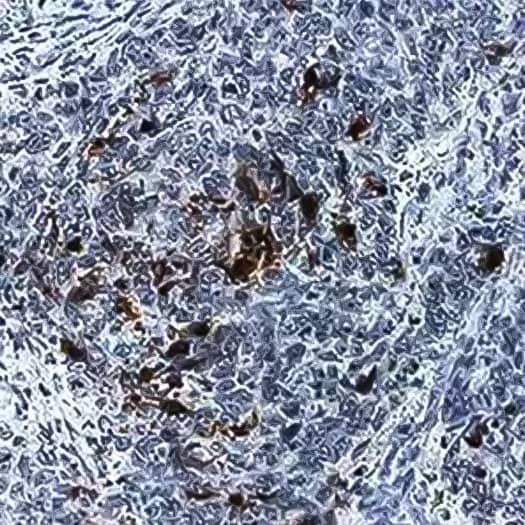Apoptotic cell death is fundamental cell process that utilizes the cell death receptor family signaling network. This key pathway is stimulated by ligands which then regulate downstream adaptor molecules, ultimately activating the caspase proteases. The caspase enzymes exist in an inactive precursor state comprised of a prodomain, as well as large and small catalytic subunits. Caspases are activated by a cleavage that occurs adjacent to an aspartate; this cleavage liberates the individual units and allows formation of an a2b2 tetramer. Caspase 3 is one member of this large family and is found in the cytoplasm. It exists in two isoforms (one acts as a dominant negative inhibitor), and specifically activates apoptosis execution within the cascade. Caspase 3 has been shown to cleave and activate numerous effectors including SREBPs, Caspase 6, Caspase 7, and Caspase 9.

Immunohistochemistry-Paraffin: Caspase-3 (Pro and Active) Antibody (31A1067) [NB100-56708] - Formalin-fixed, paraffin-embedded human breast cancer (top) and normal colon (bottom) stained with Caspase-3 antibody at 4 μg/mL.
Berges et al used the Caspase 3 antibody for their studies on downstream pathways triggered by the proteasome inhibitor bortezomib in an activated T-cell system (1). They demonstrated that activation of mutually independent apoptotic pathways activates apoptosis in mitochondria. Studies with the Caspase 3 antibody allowed Cangemi's group to collect data that suggests that the transcription factor ESE-3 binds to the caspase 3 promoter and is a potential tumor suppressor for prostate cancer (2). In intriguing gene therapy experiments focused on lysosomal storage disease (LSD), researchers from the Jikei University used Caspase 3 antibody immunoblotting to demonstrate the value of using induced pluripotent stem cells (iPS) as a model system for investigating the treatment and pathology of genetic LSD diseases (3). Hermel's group at the Buck Institute performs neurological research on the autosomal dominant disorder Huntington's disease (HD). With the Caspase 3 antibody, these researchers are untangling the specific caspase interactions and associations within the disease. Their studies exclude the involvement of caspases 9, 8, and 3 in selective death and pathogenesis processes in both the neural striatum and cortex (4). Additionally, recent studies with the Caspase 3 antibody were performed by Kasloff et al as they looked at the promise of avian influenza virus (IAV) as an oncolytic therapeutic for human pancreatic ductal adenocarcinoma (PDA) (5). Their results indicate that slightly pathogenic IAVs have a tropism for human PDA cells, can virally replicate once seeded in the proper target, and have in specific in vitro apoptosis and in vivo antitumor abilities.
Bio-Techne offers Caspase 3 Reagents for your research needs including:
- Caspase 3 antibodies
- Caspase 3 antibody pairs
- Caspase 3 ELISA kits
- Caspase 3 kits
- Caspase 3 lysates
- Caspase 3 proteins
- Caspase 3 RNAi
PMIDs
- 19735079
- 18037958
- 20385825
- 14713958
- 24899201